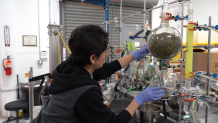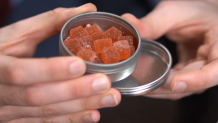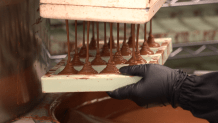What to Know
- California cannabis brands are hiring executives and seeking out investments from the tech world
- It's harder to get capital for a cannabis startup, but founders say that's rapidly changing
- With cannabis still federally illegal, some startups are moving to Canada to list on its stock exchange
Here in Silicon Valley, the stories sound all too familiar: a husband and wife starting a company in their cramped kitchen, or two friends setting up shop in a Palo Alto garage, before seeking out millions from wealthy investors.
In fact, some of those investors are the same people who rode the wave of the Internet to land among the Valley's elite. But this time, they're riding a different wave: one with countless hurdles and regulations to contend with, but immense profit potential if they get it right. It's what's led some venture capitalists to proclaim that for investors willing to take a risk, "cannabis is the new tech."
We visited some of the fastest-growing brands in the Bay Area's cannabis industry to learn how they operate and who's funding their growth.
Caliva
Backed by $75 million from former Yahoo! CEO Carol Bartz and football great Joe Montana, San Jose-based Caliva is what's known as a "vertically integrated cannabis company" — one that grows, packages and sells its products all under one roof.

With a name that's starting to appear on billboards all over the Bay Area, Caliva thinks of itself as a product company first — one that also happens to own its supply chain, a retail store, and a delivery service.
Local
"We'll use everything from this plant other than the stems, which we recycle," Caliva CEO Dennis O'Malley said, standing in the blinding orange light of one of Caliva's 13 cannabis grow rooms.
Large cannabis buds are sold individually, smaller buds go into Caliva's "roll-your-own" product, and the rest of the plant is used in countless other products, from creams to tinctures. O'Malley said that's the sort of efficiency that comes with vertical integration — but thanks to strict regulations, that doesn't come easily.
"We have one of the broadest portfolios of licenses in the state," he said. "It's very difficult to do."
Eaze
Caliva sells direct-to-consumer, but it also sells through other channels including Eaze — an increasingly-popular online ordering platform for cannabis, with over $51 million in venture capital from both tech-focused and cannabis-focused investors.

Eaze is what the industry calls a "non-plant-touching" business model: it's strictly a software company, connecting customers with cannabis retailers that already have delivery services. But its president and chief operating officer also wants Eaze to be something else:
"It's incredibly important that we are seen as a place for education, and a place to learn about cannabis and how it can influence your life," Ro Choy said.
Prior to Eaze, Choy worked in executive roles at a host of tech companies.
"It's definitely a big difference," he said. "Cannabis is a much more dynamic industry than most."
Much like OpenTable does for restaurants, Eaze provides cannabis companies with software to use internally, managing orders and inventory. Choy says a key feature of the platform is its awareness of state and local regulations around cannabis, and its ability to change quickly when they do.
Pax
Over the past two years, data from Eaze shows cannabis customers are switching from smoking to vaping, with products like those from San Francisco-based Pax Labs.

Another non-plant-touching business, Pax has over $500 million in venture capital, which its CEO says wasn't as hard to come by as some might think.
"I don't know if (cannabis) is that different from self-driving cars," he said. "It will take a long time to build… but it doesn't make anyone less excited about investing in them today."
Now on the third version of its original product, a vaporizer that heats ground-up plant material — like smoking, but without the combustion — Pax has launched the Era vape pen as a separate and fast-growing part of its business.
The company sells empty "pods" to cannabis companies that fill them with liquid cannabis concentrates, seal them in Pax-provided packaging, and sell them at dispensaries alongside the Era pen itself, which comes with a mobile app to control temperature and dosage.
Level
A Pax partner and seed-stage startup based in San Francisco, Level Blends sells what its CEO called "effects-based" cannabis products, both in Pax cartridges and in other forms, including pills.

Level's products come with names like "Elevate" and "Remedy" that describe how the specific blend of cannabinoids is intended to make the user feel. The company distills cannabis oil to separate it into its various parts, then recombines those parts in different ratios.
"Cannabis 2.0, if you will, or the next generation of cannabis, there's a lot of different ways you can use cannabis and get different effects from it," said CEO and founder Chris Emerson, who has a Ph.D. in small molecule chemistry.
Emerson said there's still plenty for science to discover about the plant — including lesser-known cannabinoids like THCV, which some believe could help curb your appetite and supercharge your attention span.
Plus
Another effects-based cannabis company, Plus Products began in a Palo Alto garage — but moved to Canada to go public on the Canadian Stock Exchange as it became the best-selling cannabis edibles brand in California.

Plus makes low-dose cannabis gummies: shiny, one-centimeter cubes that contain five milligrams of THC — or less, depending on the flavor.
"We try to address different need states, or things that the consumer's trying to get out of cannabis," said CEO Jacob Heimark. "We've identified a few that people love: for example, our sour blueberry we call 'Create' because is sort of excites your mind."
Heimark said Plus came to the edibles market at a time when dosing was a problem: cutting up a large brownie or cookie wasn't a very precise way to get a smaller amount of THC, and after one bad experience, many customers wouldn't try edibles again.
"I think everybody has that horror story they've heard of their cousin who had the brownie, who got locked in the couch and didn't move for 3 days," Heimark said.
Kiva
Any mention of edibles has to include Kiva Confections, the Oakland-based chocolatier with a little something extra infused into its candy. Kristi Knoblich Palmer and her husband started the company in their kitchen during a recession that had seen their photography business dry up.

"The Kiva company was built in partnership with Google, because we Googled our way out of pretty much every problem that we encountered," Palmer said.
Now making chocolates, mints and gummies at its Oakland factory, Kiva is also taking on distribution for other cannabis manufacturers. The company is growing with a Series A funding round from an investor who's managed to remain anonymous. Kiva has made a policy of not naming its investors.
"There is a lot of money coming into the space," Palmer said, "But it's still difficult to find the right profile of investor."
Palmer said investors in cannabis need a strong stomach for red tape — including regulations that can change from one month to the next — and an understanding of the industry whose potential for growth is, well, high as a kite.
Drawing a skyrocketing stock chart in the air with her hands, she proclaimed, "The growth expected out of the cannabis industry is hockey stick."



